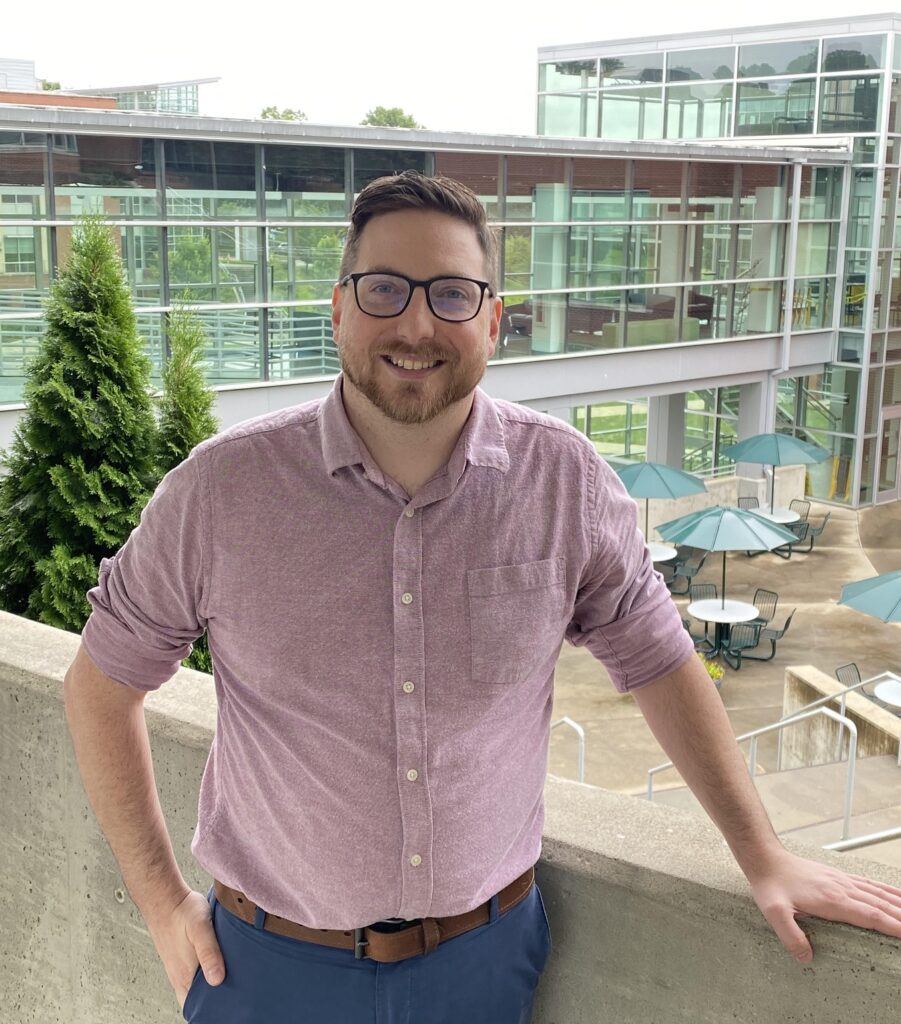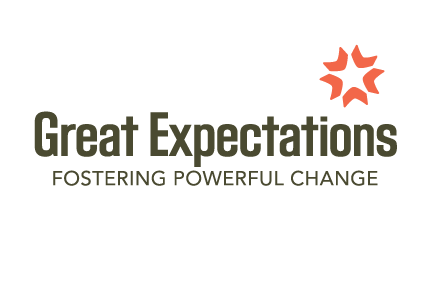Students enrolled in Great Expectations graduate at three times the national rate for foster youth.
By Erica Myatt
The name “Great Expectations” might evoke a long-ago reading assignment, Charles Dickens’ novel about an orphan. In Virginia, the title applies to an outreach program for youth and young adults who have experienced foster care and need specific supports to attain higher education. Virginia Western Community College launched its branch of the program in fall 2023.

Great Expectations Student Success Coach J.W. Taylor began his time at Virginia Western in March 2023, laying the groundwork to launch the program and assess the areas of greatest need.
“I want to make sure that there is a safe place on campus for a student to feel like they can come and have that emotional support and have an advocate on campus that can help them navigate the system,” Taylor said.
Any Virginia Western student who is currently in foster care or who has experienced foster care after the age of 13, as well as those who were adopted from foster care as part of a special needs adoption, are eligible.
Great Expectations coaches help guide participants to apply for tuition grants that can cover tuition and fees for credit or noncredit workforce programs. They also help students access resources to cover housing, food insecurity, child care needs and transportation concerns.
“We at Virginia Western are continually seeking better ways to understand the challenges that students carry on their shoulders when they enroll here,” said Dr. Robert Sandel, Virginia Western’s president. “Once we know these needs, we can align resources to help our students be successful. Great Expectations offers a way to target outreach for our students who have experienced life in the foster care system, and support them beyond the classroom setting so they can achieve their goals in education and careers.”
Spreading the word
Great Expectations at Virginia Western is currently funded through the Virginia Foundation for Community College Education, as well as with state funding.

Identifying students who could benefit involves many layers. While some students indicate on financial aid forms that they have been in foster care, Taylor learned through his contacts that filling out the Free Application for Federal Student Aid (FAFSA) can be a perceived barrier to enrollment for youth without a parent to help navigate the paperwork maze. So his role begins long before someone enrolls.
Taylor spent time in summer 2023 reaching out within the foster care community. This included local Department of Social Services offices, child placing agencies, extended foster care/independent living programs and former foster parents, since students who were adopted as part of a special needs adoption would qualify for Great Expectations. Taylor’s goal is to spread the word so this network will “know that there’s a guy here who helps foster kids get enrolled.”
He also worked to let Virginia Western faculty and staff know about Great Expectations and the needs it can meet. “Then when they’re meeting with a new student who mentions, ‘Well, I was in foster care,’ they will know there’s a program that can help that person. … I’ve already got all the advisors to listen for that kind of stuff, to let me know,” Taylor said.
Research from the University of Chicago has revealed that of people aged 17-25 who experienced foster care as a teenager, 54% of former foster youth experience homelessness by the age of 21, with 20% becoming homeless on their 18th birthday; 60% face incarceration; 58% earned a high school diploma by age 25; and less than 8% earned a college degree or certificate.
The city of Roanoke currently has the most children currently in foster care in Virginia, with approximately 40 more than Fairfax County — despite only having 8% of that county’s population. Eleven percent of all foster children currently in foster care are from localities serviced by Virginia Western. Virginia has one of the highest percentages of teens turning 18 and “aging out” of foster care, with 35% of all children leaving foster care being emancipated in 2021 (compared to the 9% national average).
There are more positive numbers because of Great Expectations. Throughout the Virginia Community College System, Great Expectations has helped more than 870 students earn degrees since the program began in 2008. Students enrolled in Great Expectations graduate at three times the national rate for foster youth.
Building a community
Elizabeth McKey has served as Great Expectations coordinator at Brightpoint Community College in Chester and Midlothian since 2017. “Our ultimate goal is that we want to see them cross that stage at graduation. We want to see them achieve that credential and not only do that, but move into the adult world independently,” McKey said.
McKey has formed a network of about 25 volunteer mentors, many of whom work at Brightpoint. She hired six tutors to specifically work with Great Expectations students, and has an advisory board with a broad range of backgrounds who help figure out how to meet students’ needs creatively. When students ran out of options to purchase certain textbooks, for example, a professor on the board had ideas on where some might be available on campus.
McKey’s office is full of snacks for when students drop by, and she gathers school supplies to distribute at a fall kickoff event for program participants, with food and door prizes. “It’s hard enough sometimes on a community college campus to build community. But when you are coming from an environment where you have felt very isolated or alone, I think it’s even harder to come in. And so one of the first things that I started doing was having monthly community-building events with the students.” Those have included visiting college campuses, making gingerbread houses together, and making bags for small children in foster care for the holidays. “We have dinner on the night before Thanksgiving. We all go to Cracker Barrel, and we have Thanksgiving dinner together.”
She has planned workshops for Great Expectations students. A recent Baking and Business workshop gave two of her students a chance to present about their baking businesses, and two of the program’s mentors who are retired business executives presented workplace tips. Then everyone rolled up their sleeves and prepared food items together.
“Every step, every service, every resource that we can provide for them makes a difference, and helps them to continue to put one foot in front of the next,” McKey said.
It’s that same spirit of community-building that fuels Taylor as he lays groundwork for Great Expectations at Virginia Western.
“For students coming in the next semester, I want to start trying to cultivate cohorts of them,” Taylor said. “So if you’re in your junior or senior year of high school, I’m going to try to find ways, whether that’s Zoom meetings or playing online games together, or coming and doing tours of the campus, doing that sort of thing, as an additional way of easing that tension, of making it feel like, ‘Community college is something I can do, and this is set up for me to be successful here.’ “
Once eligible students are enrolled at Virginia Western and part of the Great Expectations program, Taylor plans to help them connect with college resources and draw support from one another.
“Virginia Western hopes to create an environment where all students can succeed. This program will supply extra resources and safety to help students from hard places build those skills,” Taylor said.
Learn more about Great Expectations at virginiawestern.edu/great-expectations
(This story was published in the Winter 2024 edition of Impact magazine, a publication of the Virginia Western Community College Educational Foundation.)





